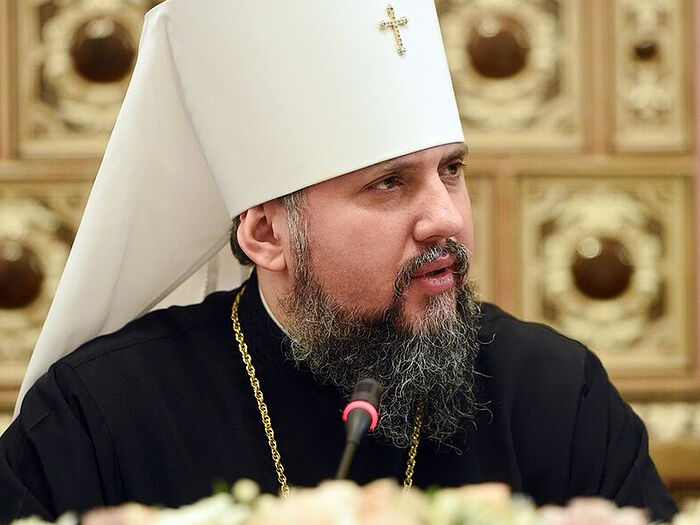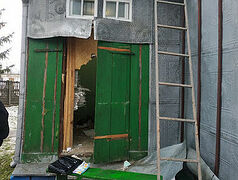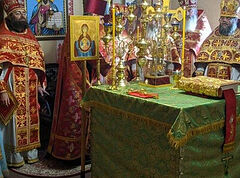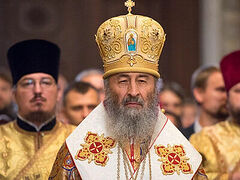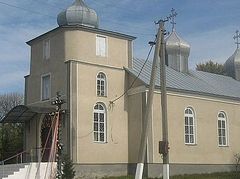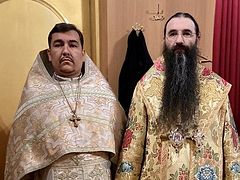Kiev, December 17, 2020
It is unfortunate that the Ukrainian Orthodox Church (UOC) under His Beatitude Metropolitan Onuphry of Kiev and All Ukraine is actively building new churches to replace those that it has lost to the “Orthodox Church of Ukraine” (OCU), believes Epiphany Dumenko, the primate of the schismatic OCU.
According to him, if the UOC wouldn’t build new churches, the people would be able to convert to the OCU more easily. He also believes that bishops remain in the UOC not out of loyalty to Christ in His Church, but out of property concerns.
On Tuesday, “Metropolitan” Epiphany Dumenko presented his primatial report to the Bishops’ Council of the OCU, covering a number of issues pertinent to the life of the OCU over the past year and since its creation in December 2018.
One of Dumenko’s tasks was to address why the transition of churches from the UOC to the OCU has largely stopped. According to him, the registration of churches, especially when involving a change of jurisdiction, has significantly slowed down on the local level for both objective and subjective reasons.
Interestingly, Dumenko begins by noting: “In accordance with the legislation, religious communities decide on statutory issues at their general meetings.”
However, it is well known that communities are often forced to convert not by vote of the religious community, but of the local village administration. Moreover, when parish communities do hold their meetings, they are often flooded with people who have no connection to the parish, who have often been bused in from other locations just to overwhelm the actual religious community in the vote.
OrthoChristian has reported on several such stories, though there are far more than we are able to cover.
However, according to Dumenko, it is the OCU that faces obstacles from regional administrations that unnecessarily delay the registration of their parishes, especially concerning those that were taken from the UOC.
Further, communities where the jurisdiction has been changed come under attack of the UOC, he says: “If a community changes its jurisdiction, it almost always faces informational, physical, and legal pressure from the Moscow Patriarchate in Ukraine and its associated political and business structures.”
The schismatic primate failed to address, however, the numerous well-documented instances of his parishioners physically beating priests and parishioners of the canonical UOC. Even international organizations, such as the United Nations, have acknowledged that the canonical UOC faces persecution in Ukraine.
The UOC launches lawsuits, blocks access to the disputed parishes, and its parishioners intimidate and pressure the OCU, Dumenko claims.
Finally, if all these measures do not work, the UOC dares to build new churches: “If all these methods of pressure and blackmail do not work, they use donors to build new premises for supporters of the Moscow Patriarchate in the locality, pay monetary support, and provide financial assistance to the most active supporters of the Russian Church.”
Earlier this year, Dumenko also lamented that the UOC files legal claims to protects its parishes from being “transitioned” into the OCU.
As a result, the conversion of parishes from the UOC to the OCU takes a long time to implement, he laments.
He also notes his disappointment that the legislation requiring the Ukrainian Orthodox Church to change its name has not been enforced yet, as courts have put a halt to it several times. Seeing that Ukraine cannot implement its own laws, political and Church figures take illegal actions against the OCU, he says, hoping they won’t be punished.
And if the “transition” of parish communities is difficult, it is all the moreso for diocesan administrations and monasteries, Dumenko says, and, in his opinion, this is the main reason why more bishops of the UOC under His Beatitude Metropolitan Onuphry of Kiev and All Ukraine have not converted to the OCU.
According to His Eminence Metropolitan Hilarion (Alfeyev), the Chairman of the Moscow Patriarchate’s Department for External Church Relations, Ukrainian authorities and schismatics convinced Patriarch Bartholomew that 25 bishops of the canonical UOC were ready to convert immediately when the OCU was created in December 2018. His Holiness Patriarch Kirill corrected Pat. Bartholomew, telling him one or two bishops would convert, which is what ended up happening.
Follow us on Facebook, Twitter, Vkontakte, Telegram, WhatsApp, Parler, MeWe, and Gab!

